 Petzlover
Petzlover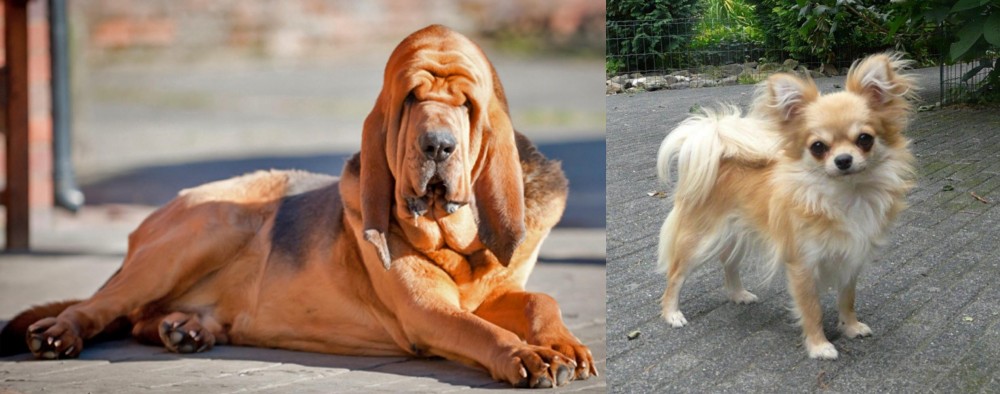 Bloodhound is originated from United Kingdom but Long Haired Chihuahua is originated from Mexico. Bloodhound may grow 31 cm / 13 inches higher than Long Haired Chihuahua. Bloodhound may weigh 69 kg / 153 pounds more than Long Haired Chihuahua. Bloodhound may live 12 years less than Long Haired Chihuahua. Bloodhound may have more litter size than Long Haired Chihuahua. Bloodhound requires Low Maintenance. But Long Haired Chihuahua requires Moderate Maintenance
Bloodhound is originated from United Kingdom but Long Haired Chihuahua is originated from Mexico. Bloodhound may grow 31 cm / 13 inches higher than Long Haired Chihuahua. Bloodhound may weigh 69 kg / 153 pounds more than Long Haired Chihuahua. Bloodhound may live 12 years less than Long Haired Chihuahua. Bloodhound may have more litter size than Long Haired Chihuahua. Bloodhound requires Low Maintenance. But Long Haired Chihuahua requires Moderate Maintenance
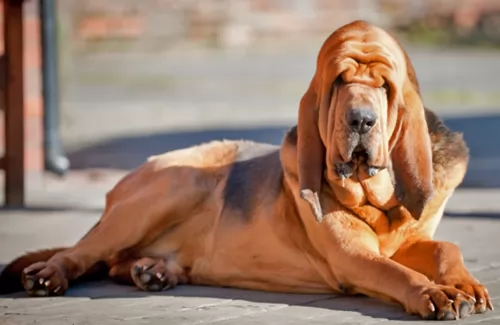 The history of the Bloodhound breed is a fascinating one. Known as a Sleuthhound for its ability to smell out the culprit and bag the prey. Even more so the Bloodhound is known for tracking and finding lost people. He is famous for finding human scents and being able to follow them even days or weeks after the person is lost. They are also able to track people over a great amount of land and have been known to successfully track escaped prisoners or wanted criminals. They are descended from the Saint-Hubert Hounds that were bred at the Abbey/Monastery at Saint-Hubert, Belgium. According to the legends the St. Hubert hounds were bred by the Monks in 1000AD. This hound was thought to be a mixed breed rather than a purebred. That’s because the ancestry of this hound is not really known but it is known that the monks bred them and sent several to the King of France annually. Only black hounds were gifted.
The history of the Bloodhound breed is a fascinating one. Known as a Sleuthhound for its ability to smell out the culprit and bag the prey. Even more so the Bloodhound is known for tracking and finding lost people. He is famous for finding human scents and being able to follow them even days or weeks after the person is lost. They are also able to track people over a great amount of land and have been known to successfully track escaped prisoners or wanted criminals. They are descended from the Saint-Hubert Hounds that were bred at the Abbey/Monastery at Saint-Hubert, Belgium. According to the legends the St. Hubert hounds were bred by the Monks in 1000AD. This hound was thought to be a mixed breed rather than a purebred. That’s because the ancestry of this hound is not really known but it is known that the monks bred them and sent several to the King of France annually. Only black hounds were gifted.
Some kings preferred not to hunt with these hounds thinking them not good enough while others thought the only use for them was as a leash hound. All described the St. Hubert as long in body with short legs. These gifts continued until the French Revolution when hunting in France was greatly reduced until the 19th century. The original St. Hubert strain became extinct in the 19th century and that the current European St. Hubert hound has its origins in the Bloodhound. The Bloodhound as a separate breed was already established in Europe by the middle of the 14th century. They were used as leach hounds to sniff out the prey so that the pack hounds could chase and keep it “at bay”. They were also used from the beginnings of the breed to track humans. At this time they were often known as sleuth hounds. As recorded by John Caius – the authority on Bloodhounds from their origins – writes about the breeds ability to find and track the scent of blood – thus becoming the Bloodhound and its use to track poachers and thieves. He also reported that the Bloodhound and the Sleuth Hound were the same basic breed. The number of Bloodhounds in Britain gradually declined until few remained after World War II. Britain has gradually built their breed back up by importing dogs from America. It was during the 19th century that the Bloodhound was imported into France by breeders who wished to reestablish the St. Hubert Hound. Thus the St. Hubert is both the ancestor and descendent of the Bloodhound. The Britain’s continue to believe that the Bloodhound is a native British breed.
The Bloodhounds in America have had great success as companion animals, with police departments and forest rangers and showing in the prestigious Westminster Kennel Club in New York. There are more Bloodhounds in the United States than anywhere else in the world.
In the end the Anglo-Saxton Bloodhound cannot be specified with any real certainty. Many believe it was not the St. Hubert that the Bloodhound descended from but rather the Norman hound or the sleuth-hound. Many believe it could have included other breeds such as the southern hound, the dun-hound and the Talbot. It cannot be proven today it the Bloodhound’s origins come from Belgian or England.
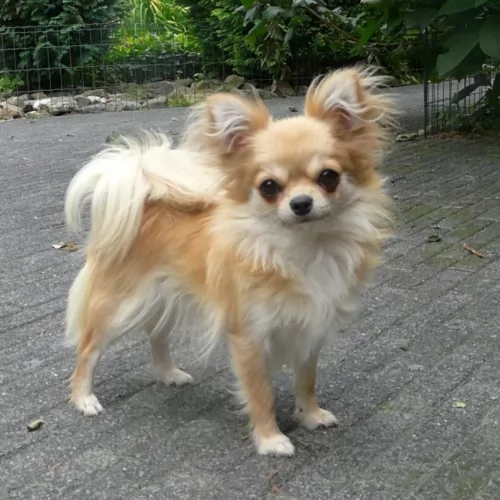 The short haired Chihuahua is such a recognizable dog breed, probably because of his tiny size, but did you know that you also get a long haired variety?
The short haired Chihuahua is such a recognizable dog breed, probably because of his tiny size, but did you know that you also get a long haired variety?
Looking quite a bit like a Pomeranian, the only difference between the two types of Chihuahua is the length of the coat.
This small dog dates back to Mayan times and while it may well have originated in Mexico, its popularity saw it becoming a sought after pet in other countries too.
To get the long haired Chihuahua, breeding programs were established and the short-haired variety was mated with other long haired toy sized dogs such as the Pomeranian and the Yorkshire Terrier.
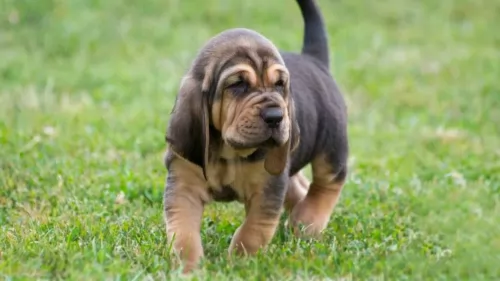 When being judged for confirmation in a show ring, the preference is for a larger dog, with an unusual skeleton in respect to its large size and heavy weight in the bones. They have a narrow head, flat at the sides, but long. They have deep set eyes buried in the deep, long face and wrinkles. The eyes might be yellow or run the gamut to deep hazel depending upon the color of the dog. The long velvety ears and thin and low set on the head. These long ears are as much a part of the Bloodhounds Olfactory system as his amazing nose. They curl backward and inward as the ends. There is a large amount of loose skin on the head and at the jowls. When the Bloodhound lowers his head the loose folds and ridges of skin are prominent on the face and forehead.
When being judged for confirmation in a show ring, the preference is for a larger dog, with an unusual skeleton in respect to its large size and heavy weight in the bones. They have a narrow head, flat at the sides, but long. They have deep set eyes buried in the deep, long face and wrinkles. The eyes might be yellow or run the gamut to deep hazel depending upon the color of the dog. The long velvety ears and thin and low set on the head. These long ears are as much a part of the Bloodhounds Olfactory system as his amazing nose. They curl backward and inward as the ends. There is a large amount of loose skin on the head and at the jowls. When the Bloodhound lowers his head the loose folds and ridges of skin are prominent on the face and forehead.
For many centuries all different colors of Bloodhounds could be found. Today however they are pretty much red, black and tan and black and liver. The Bloodhound is a powerful dog and is larger than most breeds of hounds.
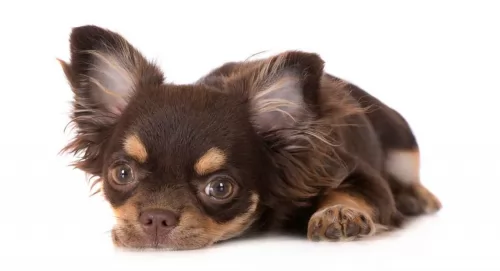 Your long haired Chihuahua will have a coat that is soft and slightly wavy. He weighs between 1 and 3kg and stands at about 15 – 23cm. He generally sheds throughout the year with a couple of heavier shedding periods during the year.
Your long haired Chihuahua will have a coat that is soft and slightly wavy. He weighs between 1 and 3kg and stands at about 15 – 23cm. He generally sheds throughout the year with a couple of heavier shedding periods during the year.
Don’t be fooled by the long, thick hair on the long haired Chihuahua as it doesn’t protect him from the cold – in fact he doesn’t tolerate the cold well at all, and is essentially an indoor dog. The ears are erect and feathery and the tail is full and plumed, lying over the back. He has a ruff on the neck, which is often described as a mane.
Chihuahuas are such bright-as-a-button little dogs and they’re intelligent too.
It’s difficult to say how a dog’s temperament will turn out, because breed, lifestyle and the type of owners can all make a dog a certain way.
Socialization and training can sometimes help with a dog that has bad genes. There are some people who say the Long haired Chihuahua is a nasty, aggressive little dog who’ll easily give you a nip but they’ve got a good reputation with many other dog lovers.
They love their own human family but may take quite a while to chill towards other people and other dogs too. They’re more ‘birds of a feather flock together’ type of dogs, preferring to get on with other Chihuahua dogs.
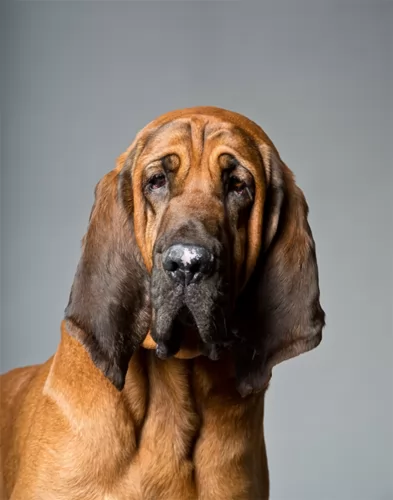 The Bloodhound is known as a gentle soul and he truly is. They are affectionate and gentle with people and children. However, their strong will to track can make them stubborn and hard to handle and train. They are easy going dogs and really like to be with people, children and other dogs. They are affectionate but tend to be set in their ways.
The Bloodhound is known as a gentle soul and he truly is. They are affectionate and gentle with people and children. However, their strong will to track can make them stubborn and hard to handle and train. They are easy going dogs and really like to be with people, children and other dogs. They are affectionate but tend to be set in their ways.
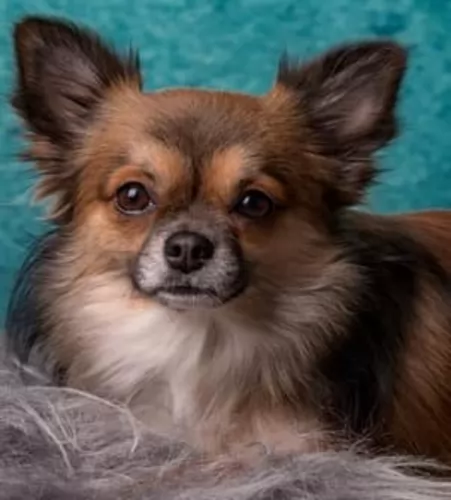 The Chihuahua is such a feisty, courageous, confident little dog who also believes that he is part- lion. He is loving, sweet and gentle and just loves being picked up and petted non-stop. He looks up at you, moving his front paws up and down to tell you that he wants to be picked up.
The Chihuahua is such a feisty, courageous, confident little dog who also believes that he is part- lion. He is loving, sweet and gentle and just loves being picked up and petted non-stop. He looks up at you, moving his front paws up and down to tell you that he wants to be picked up.
He is in 7th heaven when he can be cuddled up in your lap. You just have to teach your children to be very careful with him and not enter into games with him that are too rough and tumble. Tiny he may be but he makes a great watchdog too, barking and alerting you to strangers.
His small size makes him perfect for life in the city or in the countryside. Just be careful when in the countryside lest an Eagle or Owl scoop him up and carry him off to some faraway nest.
He doesn’t need a great deal of exercise either and you can actually keep him happily busy with some games indoors. He’ll always welcome walks with you though.
This small dog is full of life and confidence and he is ready to be your constant, loving companion.
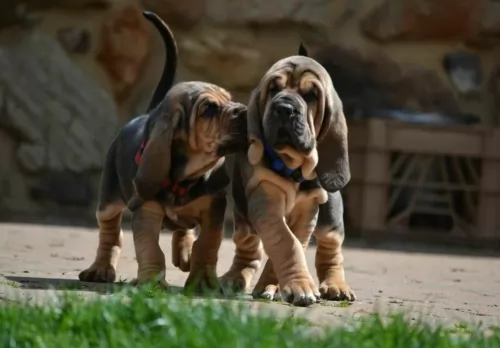 Obviously with ears like the Bloodhound there is always a chance for problems and serious infections. The ears need to be cleaned daily. Because their coat is so thick, they can overheat easily, and they are very prone to bloat, as are many large animals. However, with the Bloodhound, Bloat is the number one killer. Their lifespan is one of the shortest of all dogs at 6.75 years.
Obviously with ears like the Bloodhound there is always a chance for problems and serious infections. The ears need to be cleaned daily. Because their coat is so thick, they can overheat easily, and they are very prone to bloat, as are many large animals. However, with the Bloodhound, Bloat is the number one killer. Their lifespan is one of the shortest of all dogs at 6.75 years.
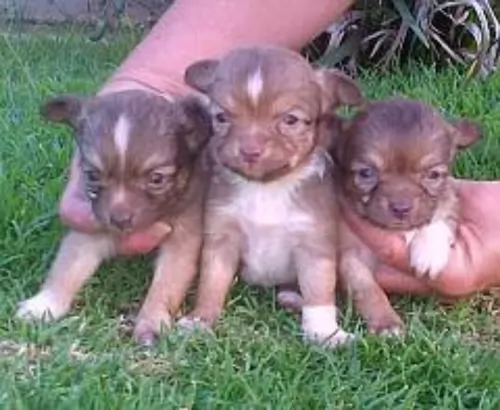 With good care, you’ll have your long haired Chihuahua with you for a long time – 15 years and longer.
With good care, you’ll have your long haired Chihuahua with you for a long time – 15 years and longer.
Make sure to de-worm your Chihuahua. Worms and other parasites can be deadly for your pet and the vet will do preventative deworming on a regular basis.
You Chihuahua will need to be vaccinated when he is a puppy and even when he is an adult, although less often. These vaccines will protect your Chihuahua from the likes of parvo, distemper and rabies. Have your chihuahua spayed or neutered.
There are so many puppies in the world who can’t find homes. Desexing your Chihuahua is a responsible way to ensure your pet doesn’t have puppies. Spaying and neutering can actually be beneficial for your dog’s health.
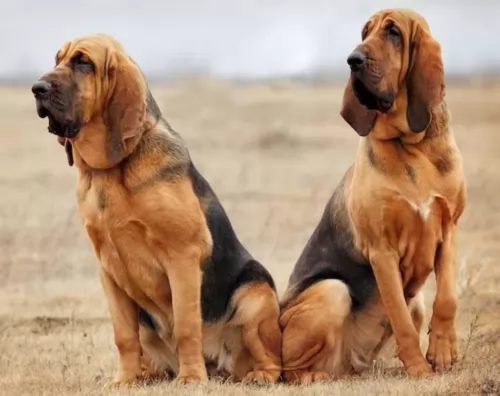 The Bloodhound is not a high energy, fast moving dog but that does not mean he doesn’t have serious nutritional needs. An overweight Bloodhound is on a course to an early demise. They should be fed a high-quality food once a day or split into two daily servings. Do not feed them right before or right after strenuous exercise and remember that strenuous exercise for a Bloodhound is considerably less than it is for a terrier.
The Bloodhound is not a high energy, fast moving dog but that does not mean he doesn’t have serious nutritional needs. An overweight Bloodhound is on a course to an early demise. They should be fed a high-quality food once a day or split into two daily servings. Do not feed them right before or right after strenuous exercise and remember that strenuous exercise for a Bloodhound is considerably less than it is for a terrier.
As previously mentioned the number one cause of death in Bloodhounds is Bloat. They are also prone to cancer. They have minor issues with their eyes, but their ears and skin are also major concerns. Clean the ears daily and wipe out the skin folds and wrinkles to prevent infections. They should be test for hip and elbow dysplasia simply because they are large dogs, though these conditions are less common in Bloodhounds.
Though the Bloodhound is known as a couch potato his stamina and activity levels are usually greatly underestimated. He can follow a scent for 7-10 hours over miles of terrain with out a problem. He needs daily exercise such as long walks on a leash. Do not take your Bloodhound out off leash because if he picks up a scent and wanders off you will not be able to get his attention to call him back.
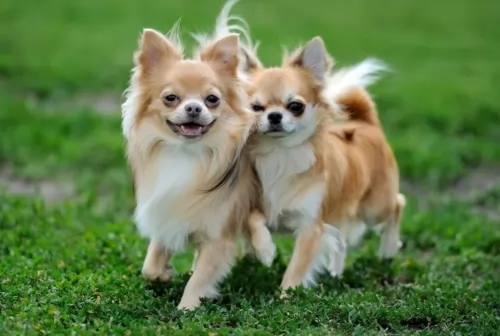 The pint-sized long-haired Chihuahua isn’t going to take up too much of your time in terms of grooming. Make sure you brush him at least twice a week to ensure his long hair doesn’t tangle. Small dogs are prone to dental problems, so try and brush his teeth at least 2 or 3 times a week with special doggy toothbrush- and toothpaste.
The pint-sized long-haired Chihuahua isn’t going to take up too much of your time in terms of grooming. Make sure you brush him at least twice a week to ensure his long hair doesn’t tangle. Small dogs are prone to dental problems, so try and brush his teeth at least 2 or 3 times a week with special doggy toothbrush- and toothpaste.
Take your puppy Chihuahua to the vet for his regular vaccinations to prevent him getting dangerous illnesses.
Feed him a high quality dog food. He is a high energy dog so buy high quality food that caters for small, lively dogs. Try and feed him such home made food from time to time. Remember that with small dogs, high-salt diets can contribute to kidney problems.
Never overfeed your Chihuahua as obesity opens up major health problems in Chihuahuas.